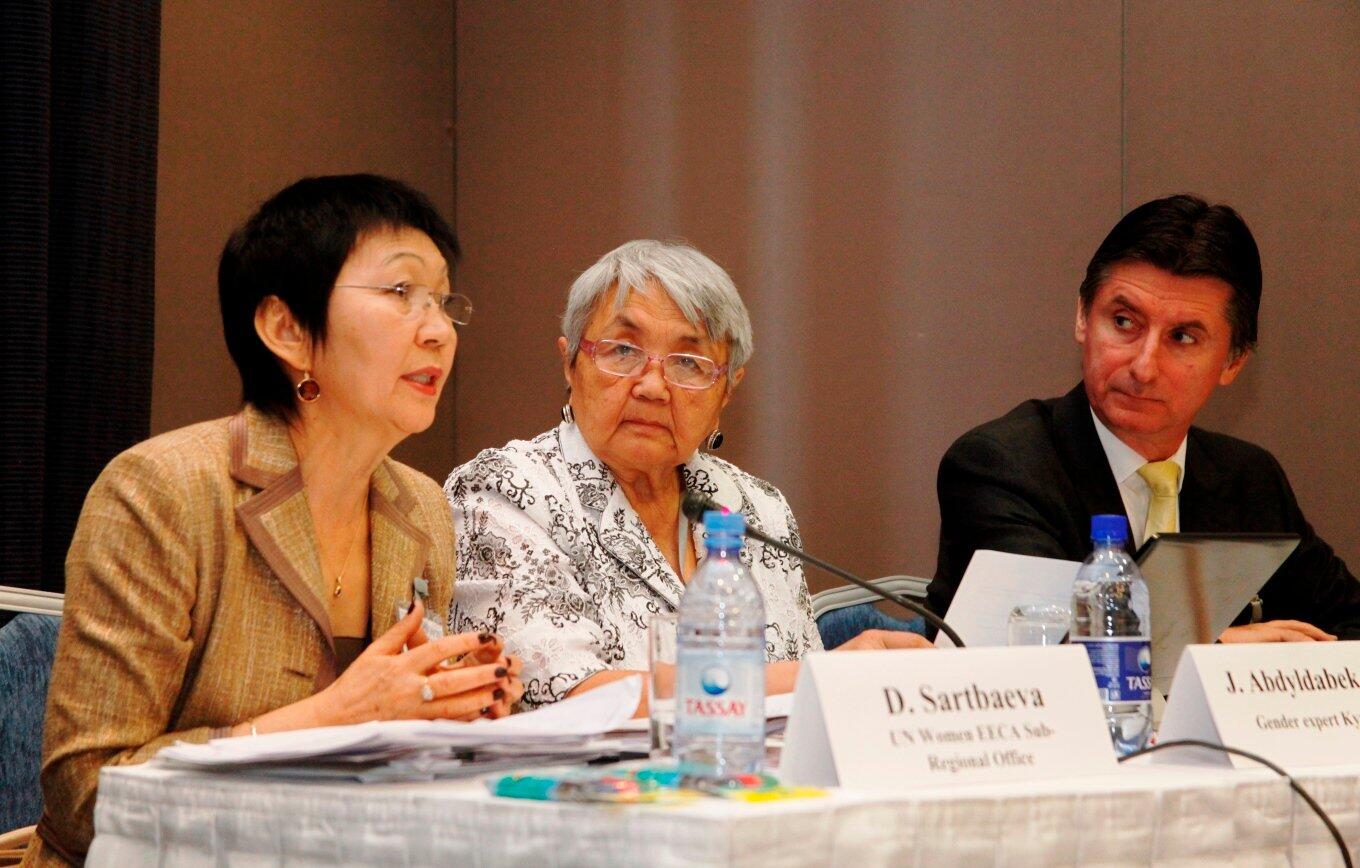ALMATY – Women are more vulnerable than men in disaster situations, but also possess untapped capabilities that could help mitigate risks for both sexes, participants in a regional meeting said last month, calling for a more gender-responsive approach to crises.
“We recognise that disaster risk reduction is important for our region due to a high risk of natural disasters and massive conflicts where women and children end up being the most affected,” said Janyl Abdyldabek Kyzy, a gender expert from Kyrgyzstan who participated in the recent Stakeholder Group Meeting on Gender and Women’s Issues in Disaster Risk Reduction. “That is why gender considerations in the context of disaster management for the post-2015 period are one of the priorities for sustainable development.”
The post-2015 disaster risk reduction framework’s high relevance to the UNFPA mandate served as the driving force for UNFPA’s Almaty Sub-Regional Office and UN Women to jointly organise and co-chair the Stakeholder Group Meeting held in Almaty from 1-2 April 2014 as part of the Regional Consultations for Central Asia and South Caucasus on the Post-2015 Framework for Disaster Risk Reduction (HFA2) organised by the UN Office for Disaster Risk Reduction (UNISDR). More than 150 participants engaged in the consultations, including key ministers responsible for disaster prevention and response, gender experts, and members of national platforms, international organisations, civil society, academia and UN agencies.
Taking a more gender-responsive approach to disaster risk reduction is an important initiative for the Eastern Europe and Central Asia region, where many countries are prone to natural disasters such as floods and earthquakes, and some have experienced manmade emergencies, which have generated humanitarian crises like the one still spilling over Syria’s borders into Turkey.
Worldwide, women are generally overrepresented in the death toll from disasters, due to factors including lack of access to resources and information, gendered social roles, and cultural constraints on their actions. In the aftermath of disasters, women’s reproductive health needs are often neglected, their care burdens are often increased while their mobility is further limited, and they can face heightened risks of sexual assault and violence. They are also typically excluded from planning for disaster preparedness and response, though tapping their community networks, caring abilities, and skills at managing resources as part of that process would benefit men and women alike.
UNFPA has long underscored the need to provide sexual and reproductive health services in crisis settings, which increase women’s vulnerability to unwanted pregnancy, HIV and other sexually transmitted infections, hazardous pregnancies, and sexual violence and exploitation. Early on, UNFPA also realised and has advocated for the importance of gender in disaster risk reduction (DRR) and has increasingly invested in both integrating and mainstreaming gender equality, women rights, family planning, and sexual and reproductive health into DRR strategies. The event in Almaty demonstrated UNFPA’s firm commitment to strengthening the disaster risk management approach during the post-2015 period.
“One of the priorities in the context of gender issues in disaster risk reduction [should be] access to information and services for sexual and reproductive health,” said Gayane Avagyan, the head of the Armenian Ministry of Health’s Maternity and Reproductive Health Protection Division. She said the meeting offered a critical opportunity to ensure that gender equality is an integral part of the post-2015 development agenda.
The Almaty meeting took place during a period when governments have been conducting reviews of the programme of action adopted by the International Conference on Population and Development and the implementation of the Beijing Declaration and Platform for Action, which culminates with the 59th session of the Commission on the Status of Women in March 2015. These parallel processes offer a once-in-a-lifetime opportunity to ensure that gender equality, women’s rights and women’s empowerment are central to these areas of work and lead to strengthened livelihoods for women and other concrete changes in their lives.
Key recommendations and commitments on gender that emerged from the Almaty discussions were incorporated into the HFA2 framework to be endorsed at the Third World Conference on Disaster Risk Reduction set to be held in March 2015 in Sendai, Japan.
The group endorsed an action-oriented outcome document with specific recommendations, indicators and commitments for a gender-sensitive post-2015 disaster risk reduction framework. In particular, the group focused on priority areas such as countries’ accountability for implementing international commitments to promote gender equality in the context of disaster risk reduction; increased gender equality at all levels of disaster-related decision-making, implementation, coordination and evaluation; and preventing gender discrimination and gender-based violence in order to reduce women’s risks and vulnerabilities during and after disasters.



